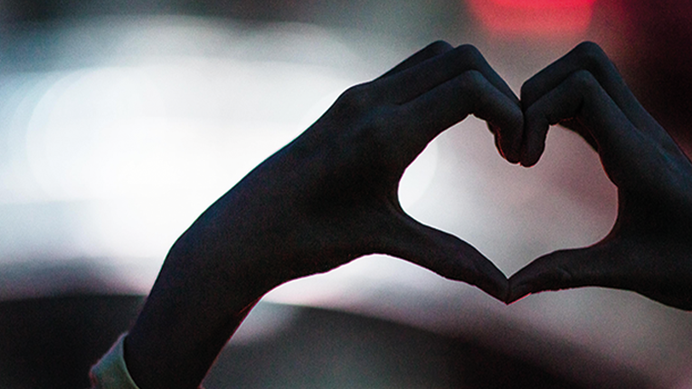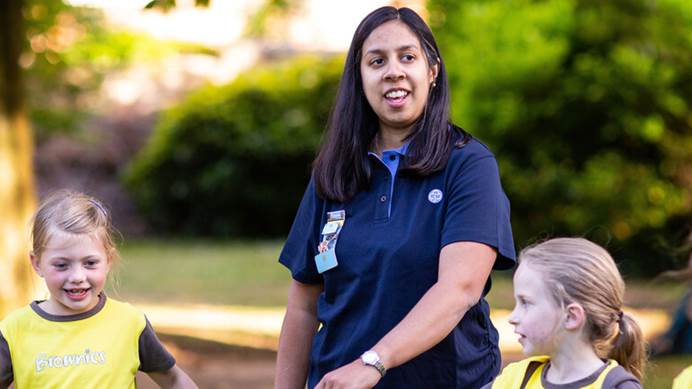Why we need to talk about the Black Lives Matter movement
Francoise and Amanda, Girlguiding advocates, speak out in solidarity about the importance of the Black Lives Matter movement
Following on from the insightful words of our chair, chief guide and CEO, as Girlguiding Advocates we want to stand in solidarity with our Black allies and educate our members on the importance of the Black Lives Matter movement.
What is the Black Lives Matter movement?
The Black Lives Matter movement began as a hashtag in 2012, following the death of a Black 17-year-old in the USA named Trayvon Martin. However, the movement only gained real momentum in 2016 as regular instances of police brutality were caught on camera and uploaded to social media providing the cause with necessary media attention. As a result, 2016 saw worldwide protests using the hashtag #BlackLivesMatter and campaigning for an end to racism across the world.
Racism has occurred through White nations using their power to deny Black people of equality, dignity, and freedom, and results in unjust treatment. This systemic racism can be broken down into overt and covert. Overt racism relates to more visible forms of racism such as police brutality, hate crime, and disproportionate incarceration. Covert racism relates to the unconscious biases that we all have. Further reading can be found in these articles from The Independent and The Guardian.
What’s sparked this renewed attention in 2020?
Last week, the death of George Floyd, a Black man from the USA who died as a result of police brutality, was filmed and has since gone viral on all social media platforms.
Following the video, the Black Lives Matter movement was reignited. Many people, both in the USA and across the world, have been protesting for all of the police officers involved in the death of George Floyd to be charged with murder, as well as protesting against police brutality in general. Some of his last words were ‘I can’t breathe’, and this has been reiterated worldwide.
His death is not in isolation: Black Americans Ahmaud Arbery and Breonna Taylor also died this year as a result of racism. Similar to 2012 and 2016, the world is protesting for the Black Lives Matter movement. This has resulted in widespread media attention, celebrity endorsement, and a global reflection on institutionalised racism and how we must do better as an international community.
Why this is relevant to us all in the UK
There is an underlying conceptual belief within the UK that racism does not exist. A key reason for this is the continued comparative drawn with the USA whereby the UK does not actively appear to be as racist as it does not engage in the same level of overt racism – this includes forms of police brutality, hate crimes, and use of racial slurs. Institutionalised racism has been entrenched in the UK, affording White privilege and disparity against Black people. This institutional and structural racism is clearly evident throughout history – for instance the 1968 ‘Rivers of Blood’ speech made by Enoch Powell, the National Front, the Windrush scandal and recurring slogans of ‘stop immigration and start repatriation’ following the Brexit referendum.
This deep-rooted racism displays itself through many forms such as microaggressions. This is referred to by lawyer and political and women’s rights activist Dr Shola Mos-Shogbamimu as the ‘weaponisation of whiteness’, and it is incumbent across all key areas including the UK’s economic structure, justice system, academic institutions, and the workplace.
The UK regularly sees disproportionate treatment from the police against Black people: for example, one study showed that a Black person is 28 times more likely to be searched than a White person. Equally, the cases of Sarah Reed, Sean Rigg, and Mark Duggan, to name but a few, show that the UK police force have engaged in brutal force.
Our way of life in the UK – social , economic, cultural, political – is predicated on underlying racist views. This is what we mean by structural racism. If the majority of UK citizens took an unconscious bias test, what would the result be? It could possibly show that many citizens would associate Black people with criminality or would suspect Black people as less likely to do their job to the same standard as White people. This must change.
Showing solidarity and the importance of allyship
Black lives matter – now and always. Critics of the movement have tried to argue that the title should be ‘All Lives Matter’. However, this misses the point of the movement. No one questions whether White lives matter – society has accepted that as a given.
Black lives, on the other hand, are the ones questioned and in danger. Their lives need fighting for. Saying that Black lives matter does not make non-Black lives matter any less. Another way to look at the movement title is: Black Lives Matter Too.
Unless Black lives matter, all lives will not matter and therefore the campaign to end racial injustice will never be achieved. You must be an ally and support the message of Black Lives Matter, otherwise you too are part of the problem.
It’s crucial that everyone shows their support and solidarity. You cannot expect the Black community, a community which has suffered for so long, to be the only ones trying to solve a problem that they did not create in the first place. Structural racism has a profound impact on the mental health of all Black people. It is only through coming together and joining forces that we can begin to ensure a better quality of life for Black people. Everyone must play a role in the fight.
White people need to recognise and understand their privilege, a privilege that they’re not often made to think about but exempts them from the hardship of life that comes with being Black. White people then need to use this privilege to speak out and take action in order to better society. And by that, we do not mean only posting a black square on social media, tagging 10 friends, and calling it a day. Awareness is great, but it is not enough. Those with privilege need to stand with the oppressed and fight for the oppressed. We all collectively need to take real, tangible action to help the current and future generations.
What can we do now?
There are many ways you can get involved and help the cause:
- Educate yourself – start with books or blog posts, like this one, to understand your own privilege and the struggles of others. Recognise any unconscious biases and seek to challenge them through actively engaging with resources.
- Participate in a protest or voice your political opinion – use your voice to affect change and ensure that the life of George Floyd and other Black people mean something. Use your social media platform to spread the message. You can even contact your local MP! Only engage in protests if it is safe for you to do so.
- Start the conversation and speak up – listen to stories and challenge the behaviour, words, or conduct of other people. Try to get to the root of the problem. Recognise microaggressions and speak up.
- Sign online petitions (many can be found on Change.org) and donate to relevant organisations. Some of the key current ones are ensuring all four officers involved in the George Floyd death are charged and transforming the UK education system to ensure it covers the UK’s institutionalised racism.
- Support UK anti-racist charities such as Black Lives Matter UK and Show Racism the Red Card.
- Support Black-owned businesses.
If you’re tired of hearing about racism so much over the past days, just think how tired Black people must be from facing it constantly.
People should not have to die for those outside of the Black community to feel enraged, upset, and angered. Racism is never ok. To be treated with respect and to be able to live, to breathe… these are fundamental human rights. Equality, liberty, and dignity are human rights to all – regardless of racial background.
We need to use our voices, not just today, but all of the time.
We need to educate ourselves and those around us, not just today, but all of the time.
We need to be more than not racist; we need to be anti-racist, not just today, but all of the time.
Following the wise words of George Floyd’s daughter, Gianna who stated that ‘Daddy changed the world’, we call on all members to carry on making that change.
‘Silence is violence’. Taking action is the answer. Together, we must create a world where Black Lives Matter.
Recommended resources
Continue learning about antiracism and racial injustice with these resources.
To read
- How to talk to your children about race and racism, from the BBC
- So You Want To Talk About Race, Ijeoma Oluo
- How to be an Antiracist, Ibram X Kendi
- Slay In Your Lane, Yomi Adegoke and Elizabeth Uviebinené
- Women, Race, & Class, Angela Y. Davis
To watch:
- Let’s get to the root of racial injustice, Megan Ming Francis



